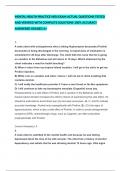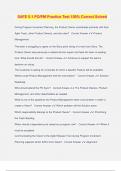-
1. Examen - Diagnostic testing hesi prep- adult care questions correctly answered!!!
-
2. Examen - Safety hesi prep adult care questions and answers
-
3. Examen - Adult care hesi prep questions- culture questions and answers 100% answered
-
4. Examen - Hesi pediatric exam questions and updated answers
-
5. Examen - Med-surg ii hesi test bank questions and answers 2024
-
6. Examen - Diagnostic testing hesi prep- adult care questions correctly answered!!!
-
7. Examen - Safety hesi prep adult care questions and answers
-
8. Examen - adult care hesi prep questions- culture questions and answers 100% answered
-
9. Examen - hygiene/sleep/elimination hesi prep adult care questions with complete solutions
-
10. Examen - Adult care hesi prep- acid/base questions and answers
-
11. Examen - Diagnostic imaging hesi test prep questions and answers
-
12. Examen - hygiene/sleep/elimination hesi prep adult care questions with complete solutions
-
13. Examen - hesi fundamentals practice exam questions and answers
-
14. Examen - Hesi pn exit exam v3 110 questions and answer(s)
-
15. Examen - Rn exit v2 test ****a+ hesi med surg real exit exam with ngn updated latest solutions
-
16. Examen - 2024 hesi maternity ob exam version 3 latest all 55 questions and correct answers |al...
-
17. Examen - Hesi pn exit exam questions with correct answers 2024 update| verified and graded a+
-
18. Examen - Hesi lpn exit exam merged from 2019/2020&2021&2022&2023&2024 best for 2023/2024 actu...
-
19. Examen - Pn hesi exit v2 exam, 160 100% verified questions and answers latests updated 2024. d...
-
20. Examen - Ngn hes exit rn_exam 15 exam sets 2500 qa newest 2023/2024 hesi rn exit exam rn e...
-
21. Examen - Ngn hesi a2 exit exam 2023- 2024 chamberlainuniversity latest exam (guaranteedpass)
-
22. Examen - Hesi rn exit exam questions and answers (100% verified answers) latest update 2023-20...
-
23. Examen - 2023/2024 all hesi fundamentals exam test bank updated question with rationales and a...
-
24. Examen - Hesi health assessment testbank latest with 1000 questions and valid questions and an...
-
25. Examen - New comprehensive hesi exit rn exam set(15exam sets, 2500 + q & a, latest updated 202...
-
26. Examen - Hesi rn exit exam 2024 latest update questions and verified correct answers by expert...
-
27. Examen - hesi exit exam 2024 latest update questions and verified correct answers with comple...
-
28. Examen - Mine ngn hesi rn 2024 exit exam latest questions with complete correct answers 100% v...
-
29. Examen - Hesi a2 conversions questions 100% solved
-
30. Examen - Hesi a2 chemistry questions and answers verified by expert graded a+
-
31. Examen - Hesi mental health rn v1-v3 test bank questions with complete solutions verified
-
32. Examen - Hesi mental health rn v1-v3 2022 exam questions with complete verified answers update...
-
33. Examen - Hesi rn exit exam v1-v7 description exam questions with complete solutions verified
-
34. Examen - Hesi rn mental health exam questions and verified answers updated graded a+
-
35. Examen - mental health hesi exam actual questions with complete verified correct answers 100%...
-
36. Examen - Hesi mental health actual exam questions 100% solved with correct verified answers gr...
-
37. Examen - 2023-2024 hesi mental health rn exam questions with complete verified solutions
-
38. Examen - Hesi- mental health exam questions and answers 2024 verified by expert graded a+ upda...
-
39. Examen - Hesi mental health exam questions with complete solutions answered correctly
-
40. Examen - Mental health hesi exam questions with complete solutions verified
-
41. Examen - Hesi mental health exam questions with complete verified answers graded already pass...
-
42. Examen - Mental health hesi exam questions with complete solutions updated
-
43. Examen - Hesi mental health exam questions and verified answers by expert updated 2024
-
44. Examen - Mental health hesi 2024 exam questions with complete verified answers
-
45. Examen - Hesi mental health exam questions with complete verified answers graded a+
-
46. Examen - Mental health hesi latest exam questions with complete solutions answered 100% verifi...
-
47. Examen - Mental health hesi exam questions with complete solutions answered and verified grade...
-
48. Examen - Evolve hesi mental health exam questions with complete verified answers 100% guarante...
-
49. Examen - Mental health hesi (? only) exam questions with complete verified solutions already ...
-
50. Examen - Hesi mental health exam latest questions with complete verified answers updated grade...
-
51. Examen - Hesi mental health review exam questions with complete solutions verified graded a+
-
52. Examen - Hesi mental health exam questions with complete solutions verified
-
53. Examen - Mental health hesi exam questions with complete solutions verified
-
54. Examen - Mental health hesi quiz and correct answers updated
-
55. Examen - mental health hesi review exam questions with complete solutions verified
-
56. Examen - Mental health practice hesi exam actual questions tested and verified with complete s...
-
57. Examen - Hesi mental health medications exam questions and answers with complete solutions ver...
-
58. Examen - Hesi lpn-adn entrance hesi lpn-adn entrance exam (mobility exams) a+ graded 100% veri...
-
59. Examen - hesi lpn- entrance exam questions with complete solutions verified and graded a+ lat...
-
60. Examen - Hesi entrance exam questions with complete solutions verified latest update 2024/2025
-
61. Examen - Hesi entrance exam latest actual questions and verified correct answers 100% guarante...
-
62. Examen - Hesi (entrance exam) questions with complete solutions verified latest update 2024
-
63. Examen - hesi entrance exam questions with complete solutions verified and graded a+
-
64. Examen - Hesi entrance exam 2024 actual questions and verified correct answers already graded ...
-
65. Examen - Hesi entrance exam vocabulary exam questions with complete solutions 100% answered an...
-
66. Examen - hesi entrance exam questions with complete solutions verified graded a+ already pass...
-
67. Examen - Hesi entrance exam(2) questions and verified correct answers latest update. 100% guar...
-
68. Examen - Hesi a2 entrance exam questions with complete solutions and correct answers latest up...
-
69. Examen - Hesi entrance-chemistry exam questions with complete solutions verified
-
70. Examen - Nur 2520 hesi all exam questions and answers new update 2023/2024 top ranked a+ best ...
-
71. Examen - Hesi exit exam 750 qs & ans/ hesi exit rn exam / hesi rn exit exam (newest, 2022/2023...
-
72. Examen - Hesi rn exit exam 2024 questions with complete solutions 100% verified graded a+
-
73. Examen - Critical care hesi practice exam questions with complete solutions verified graded a+
-
74. Examen - Critical care hesi exam questions and answers with complete verified 100% solutions g...
-
75. Examen - Critical care hesi exam questions with complete solutions 100% verified graded a+
-
76. Examen - Critical care hesi exam latest questions and answers with complete solutions verified...
-
77. Examen - Critical care hesi exam questions with complete solutions verified 100% guaranteed pa...
-
78. Examen - Critical care hesi exam questions and answers with complete solutions verified
-
79. Examen - Critical care hesi exam questions with complete solutions verified graded a+
-
80. Examen - Hesi critical care exam questions with complete solutions 2024/2025 graded a+
-
81. Examen - Critical care hesi practice questions and answers with complete solutions verified gr...
-
82. Examen - Critical care hesi practice questions and answers with complete solutions 100% verifi...
-
83. Examen - Hesi 4 review - critical care - mca 3 exam questions with complete solutions 100% ver...
-
84. Examen - Critical care hesi review exam questions with complete solutions verified graded a+
-
Montrer plus





